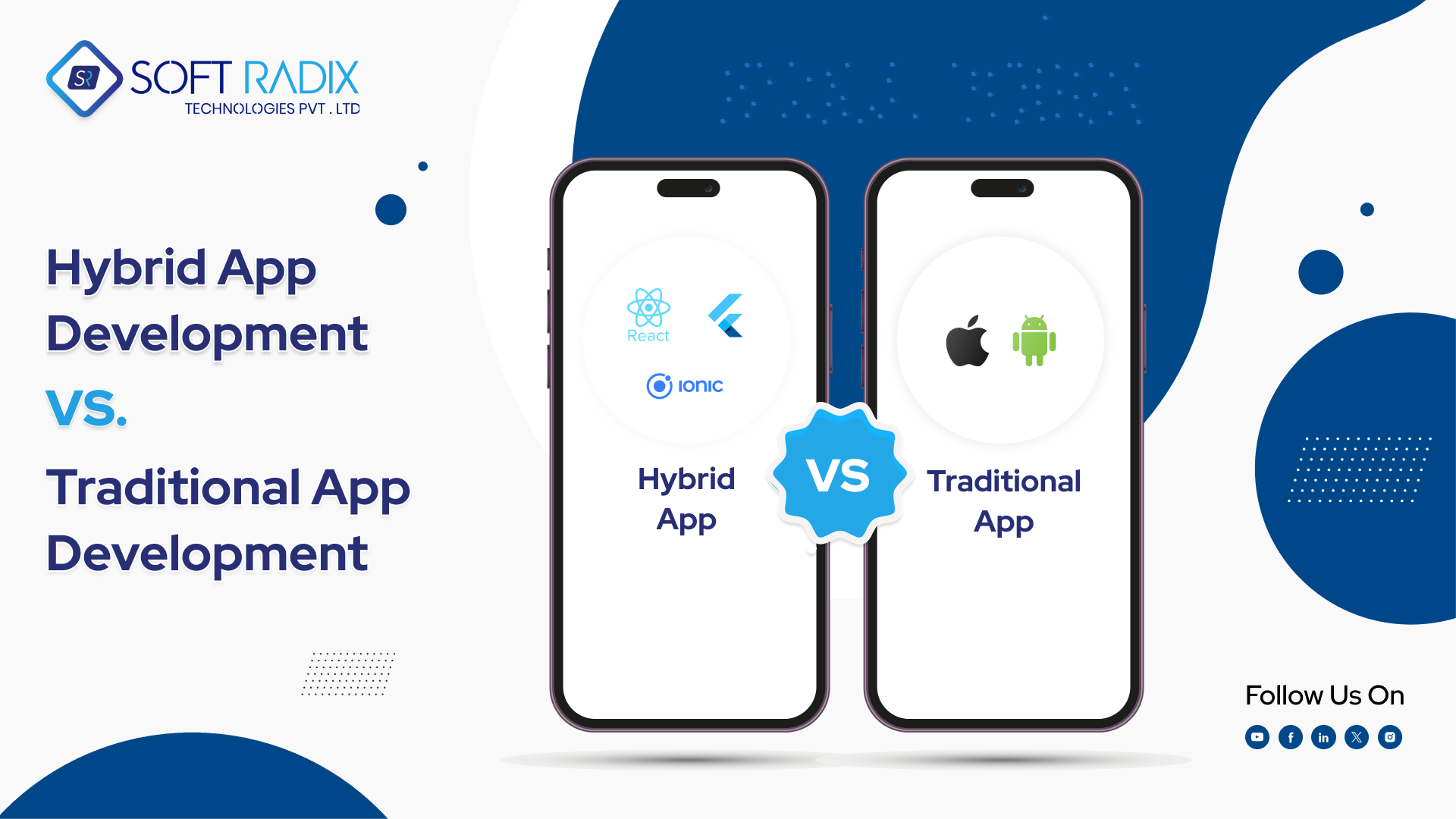
As mobiles have become so common in our lives, the demand for upgraded mobile applications has also increased to keep up with the technology. In such competition for developers it is important to decide between hybrid and traditional app development. Even for the business it is important to decide to keep the cost low and quality better by knowing the pros and cons. By weighing these two options one can select the right and better approach that best fits their business objective and technical needs. In this blog we will find out the difference between these two approaches to make the right choice.
Understanding Hybrid App Development
It is a method that combines the elements of both native and web applications. There are many top hybrid app development company in the market nowadays. It functions as a web app within a traditional shell, allowing it to be installed on mobile devices like any native app. Hybrid app are usually built using web technologies like HTML, JavaScript. CSS and more so it can run across multiple platforms using a single codebase.
Exploring Traditional App Development
It is a method of creating a separate application for each mobile platform tailored to its unique architecture and capabilities. In this app development method, developers use languages according to the platform like Swift or Objective-C for iOS and Java or Kotlin for Android. This approach optimizes the app for the platform by delivering superior performance, smoother user experience, and access to device-specific features like camera access and hardware acceleration. It is time-consuming and costly but has its own benefits that fully leverage the platform’s strengths.
Pros And Cons Of Hybrid App Development
| Aspect | Hybrid App Development | Traditional App Development |
|---|---|---|
| Cross-Platform Compatibility | Pros: It reduces development and cost as this method uses a single codebase allowing it to run on multiple platforms like iOS, Android and etc. All this makes it ideal for business with limited budgets or for those seeking a quick launch. | Cons: It requires more development time and costs as it needs separate codebases are required for each platform. However, this results in apps that are fully optimized for each specific platform. |
| Faster Development | Pros: As these apps apps are built with a single codebase so they can be developed and deployed much faster than traditional apps. This speed is very important or businesses aiming to enter the market quickly or test new ideas with minimal risk. | Cons: Traditional app development involves separate codebases for iOS and Android, leading to longer development times. This can be a drawback for businesses looking for rapid market entry. |
| Cost-Effectiveness | Pros: it reduce the cost so it is a good option for startups or small businesses because it uses a single codebase which ultimately reduces the cost of testing, development and maintenance. | Cons: Developing native apps requires specialized developers for each platform, leading to higher upfront costs. |
| Performance | Cons: Hybrid apps may face performance limitations due to reliance on a web view for rendering content. They may not be as fast or smooth as native apps, particularly in graphics-intensive applications like games. | Pros: These apps are built for a particular platform, ensuring optimal performance. |
| User Experience | Cons: As hybrid apps are not fully optimized for any particular platform it can lead to less satisfaction and engagement. | Pros: It leads to a better user experience as they are fully optimized for the particular platform leading to more engagement. |
| Easy Maintenance | Pros:These apps are easy to maintain as you can update and fix bugs easily across all the platforms at once. | Cons: Maintaining multiple codebases can be complex and resource-intensive, requiring separate updates, bug fixes, and testing for each platform. |
| Scalability | Pros: Hybrid apps can be scaled across platforms more easily due to the single codebase. | Pros: Traditional apps are typically easier to scale as they grow in complexity. Developers can optimize native apps without concerns about cross-platform compatibility. |
| Development Costs | Pros: Because of shared base code the development cost is effective. | Cons: We need platform-specific codebases and specialized developers to develop the app so it costs more. |
| Development Time | Pros: Faster development time with hybrid apps can be crucial for businesses needing quick market entry or those testing new ideas with minimal risk. | Cons: Longer development time is required for native apps, which can be a disadvantage for businesses seeking rapid deployment. |
| Maintenance | Pros: Maintenance is simpler with hybrid apps as updates are applied across all platforms simultaneously. | Cons: Maintenance can be complex and costly with traditional apps due to the need to manage and update separate codebases for each platform. |
Right Approach Of App Development
The choice between hybrid and traditional app development depends on various factors like needs, budgets and goals. As we read above hybrid development of apps is a great option for you if you want to reach a broad audience in a small budget. On the other hand, traditional app development is a good option for you if want better performance, user experience, and full access to device features. It requires a large investment in terms of time and money for high-quality app tailored to the platform’s strengths.
Final Words
Both of these app developments have their own pros and cons. It completely depends on ones project’s needs and budget. Hybrid development is cost-effective and good for reaching a broad audience quickly with a single codebase supporting multiple platforms. It’s ideal for simple applications or those with rapid market entry. However, it may not fully leverage device-specific features. On the other hand, traditional app development offers better performance as it provides access to advanced device features. It provides a better user experience but with higher costs and longer development times. By keeping the pros and cons of each approach angling with your goal you can make the right choice.






